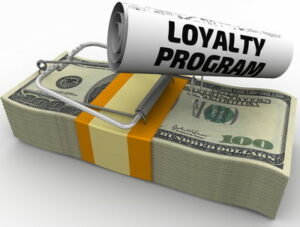 If you are a bettor then there is a good chance that you understand how loyalty programs work from a betting point of you. Not all of them are the same, of course, but in essence the idea is that the more that you spend with a company, the more they will see to giving you back by way of a reward.
If you are a bettor then there is a good chance that you understand how loyalty programs work from a betting point of you. Not all of them are the same, of course, but in essence the idea is that the more that you spend with a company, the more they will see to giving you back by way of a reward.
The interesting thing is that we might also fall foul of the loyalty effect ourselves. Have you ever won a reasonable amount of money with a bookmaker but, rather than withdraw it all, you’ve left some in your account to keep betting with?
In a way, this makes complete sense. After all, you need a bankroll in order to keep betting so why would you withdraw all of the money only to have to make a deposit at another time? In another way, though, it is us demonstrating our loyalty to that company by essentially choosing to give them back some of the money that we won.
We don’t do it deliberately, of course, but the longer you keep gambling for, the more likely it is that you’re going to end up losing your money on account of the fact that the House always wins.
Loyalty Programs
 The likelihood is that you will have a sense of what a loyalty program is, even if not in the world of gambling. If you have ever bought a coffee, tea or hot chocolate from a store that allows you to collect stamps, giving you a free drink when you’ve got a given number of stamps on your cards, then you’ve seen such a program in action.
The likelihood is that you will have a sense of what a loyalty program is, even if not in the world of gambling. If you have ever bought a coffee, tea or hot chocolate from a store that allows you to collect stamps, giving you a free drink when you’ve got a given number of stamps on your cards, then you’ve seen such a program in action.
For gambling companies, the idea is that you will bet, say, £5 and for every £30 you wager in £5 lumps you’ll be given a free bet token that is worth £5. It has to be used with the betting company in question, just like the free drink has to be bought from the same shop.
The idea behind this is that it rewards you for your loyalty, inspiring loyalty back. If you know that you’re going to be given a reward for spending money that you were going to spend anyway, why wouldn’t you keep on spending it?
That is the logic behind the marketing strategy that is a loyalty program, which tend to be popular because people see it as being given something for nothing. It doesn’t cost the betting company anything and there are normally loops to be jumped through in order for you to actually win anything at the end of it.
There are, of course, other ways in which betting companies inspire loyalty from customers. The evidence actually suggests that loyalty programs inspire little true loyalty for gambling companies. Yet there is little doubt that people tend to use their favoured site on a regular basis.
Why would this be the case if not for the loyalty inspired by such schemes? It comes via all sorts of different avenues, including how much people might simply enjoy the manner in which the site works or the odds that they get on the events that they like to bet on.
What Loyalty Leads To
 Whilst loyalty in and of itself might be seen as a good thing, there are numerous mistakes that punters make on account of their loyalty. Having been given a free bet token, for example, some people will see it as ‘free money’ and bet accordingly. That is to say, they will not do the same level of research and investigation into a bet that they would do ordinarily, instead placing a mug wager.
Whilst loyalty in and of itself might be seen as a good thing, there are numerous mistakes that punters make on account of their loyalty. Having been given a free bet token, for example, some people will see it as ‘free money’ and bet accordingly. That is to say, they will not do the same level of research and investigation into a bet that they would do ordinarily, instead placing a mug wager.
This might well be a subconscious decision to effectively give the money back to the bookmaker because of the loyalty they’ve shown.
Over a length of time, a betting site will always win. The phrase ‘the House always wins’ isn’t just some odd platitude but instead a truism based on the way in which such companies are setup. They are designed to take your money, so if you win big you should be taking all of the money and running.
Rather than doing so, many punters will instead keep betting, slowly but surely giving back most of the money that they had won in the first place. This form of loyalty isn’t a good thing, yet it is something that many of us do with our winnings.
Free bet tokens should be given the same amount of research and thought as a bet placed with our own money would be, but rarely do we give them as much. They are ‘free’ in our minds, a reward for our loyalty, so we simply don’t engage with them in the same way as if we’d deposited the money that we’re betting with.
This is the downside of loyalty, from a punter’s point of view, and is something that people aware of the loyalty effect need to be careful of engaging in. Just because the bet is ‘free’ doesn’t mean that it should be wasted.
It’s Not Just Winners That Stay Loyal

Whilst winners who end up putting some or all of their winnings back into their account are an obvious example of loyalty gone wrong, it isn’t the only example.
Those that either win little or even lose regularly will also remain loyal to a brand. The likes of free bet clubs, promotions and offers will all conspire to keep us placing bets with the same company for a prolonged period of time. What this will often mean is that we don’t shop around for better promotions, more interesting offers or even odds that are more favourable to us.
Loyalty is a good thing in friendships, relationships and life in general, but it isn’t really a good thing in the world of betting. Betting companies might appear to be loyal to you with their offers and promotions, but the second that you start to win on a consistent basis you will soon find your account being limited.
The loyalty often only goes one way, but because of the likes of free bet clubs, which are designed to take your money in the long-run, we think that betting companies are being loyal back to is. They aren’t, as winners find out all too quickly.
